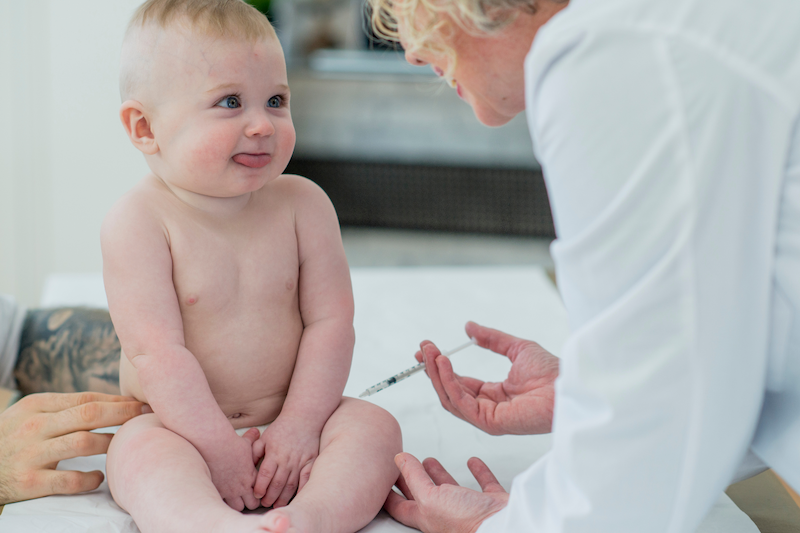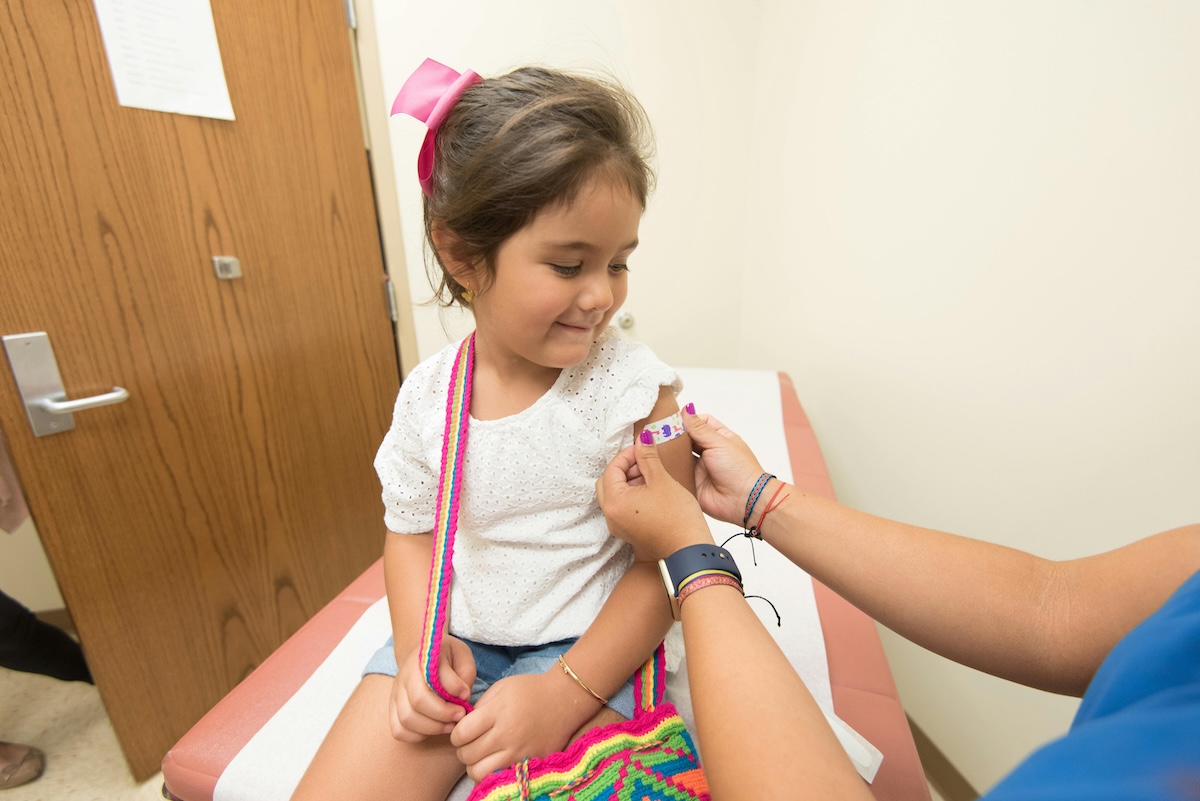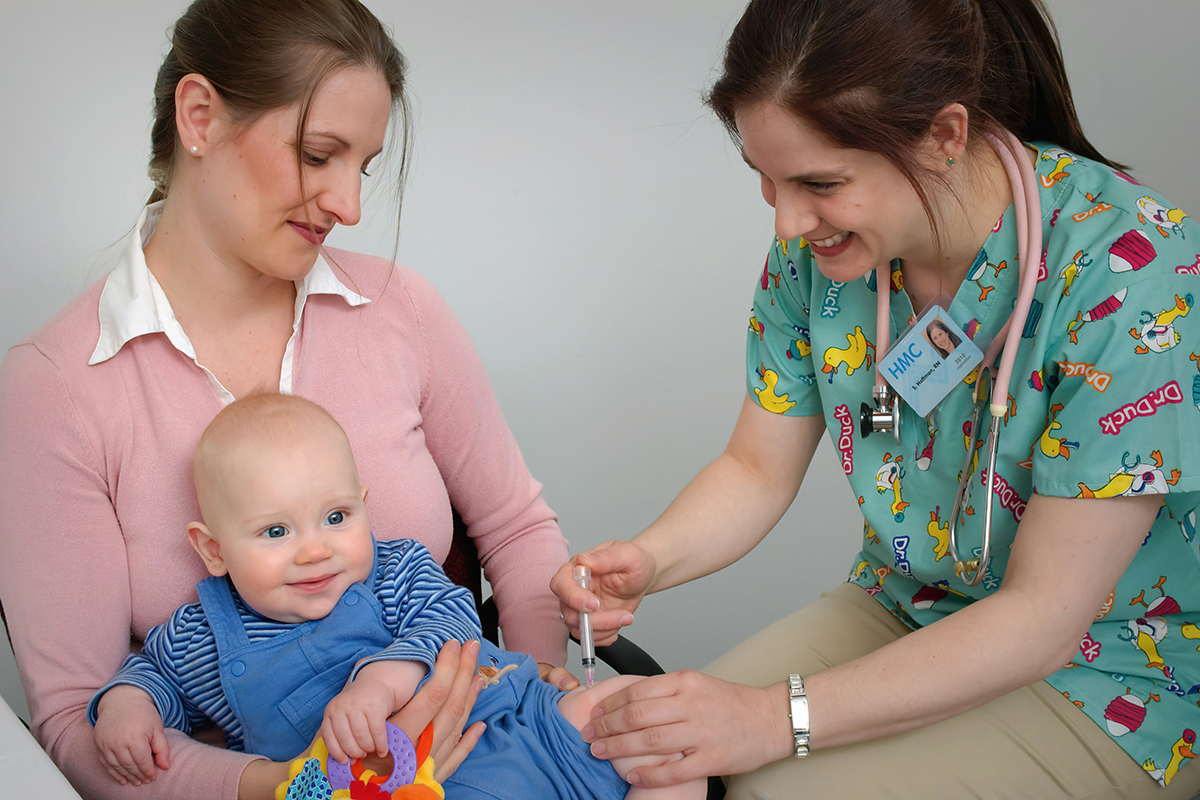The need for evidence-based policy and guidance on vaccines is more crucial than ever. We are also seeing significant changes in who makes decisions about vaccines in the U.S. Robert F. Kennedy, Jr. is heading up Health and Human Services, and he has made no secret of his distrust of the current approach to vaccines.
What started as an active debate about vaccine safety during childhood and pregnancy has led to possible changes in the availability of vaccines for those who want them. This is not only bad from a public health perspective but also incredibly confusing for pregnant people and parents of young kids who are navigating these decisions.
I do not have a crystal ball for what will happen long term, but I can offer context for what has happened so far and what might happen going forward.

Background: FDA and ACIP
There are at least two important players in vaccines in the U.S. The first is the FDA, which is responsible for approving vaccines. When a drug manufacturer develops a new vaccine, it undergoes a series of (placebo-controlled) trials supervised by the FDA before being evaluated for approval.
The Advisory Committee on Immunization Practices (ACIP, pronounced ay-sip) is inside the CDC. This group is responsible for making recommendations about who should receive vaccines. Most notably, this is the group that develops the recommended pediatric vaccine schedule. During the pandemic, this group had an important role in making recommendations about who should receive the COVID-19 vaccine.
ACIP follows the FDA; they do not approve (or disapprove) vaccines on their own. If this committee, for example, removed a vaccine from the childhood vaccination schedule, that would not mean that children could not immediately get the vaccine. However, they play an important role in what is recommended by pediatricians and what is covered by insurance, including public insurance like Medicaid. Removing something from the recommended pediatric vaccine schedule could mean that some insurers or public providers of vaccines might not offer it, making access challenging down the line.
There have been changes in both FDA vaccine oversight and ACIP with the Trump administration. Paul Offit, a long-time member of the FDA vaccine advisory committee and prominent supporter of vaccines, was removed from his position. There have been more dramatic changes to ACIP: RFK Jr. removed all 17 members when he entered and replaced them with people more skeptical of vaccines.
These changes to oversight do not directly change vaccine recommendations, but they mean such changes are likely. Adding additional confusion is the fact that some states and insurers have indicated they may no longer be following the ACIP recommendations, given the changes.
What are the changes to vaccines so far?
Let’s start by saying that long-term changes are hard to predict. Two years ago, I’m not sure anyone had “maybe we won’t have the measles vaccines” on their bingo card. But here’s what has happened so far and some speculative guesses for the future.
COVID vaccines
Relative to 2023 and 2024, access to COVID-19 vaccines will be curtailed in 2025 and going forward.
This is true for several reasons. Most importantly, the FDA has approved updated vaccines only for use in older adults (over 65), individuals with a wide range of chronic conditions, and children 6 months to 18 years. The range of eligible conditions is wide, but this entire discussion has reinforced an already low rate of booster access.
The second change is a change to ACIP recommendations. At the September 19, 2025, ACIP meeting, the committee changed its language on this from saying the vaccines are “recommended” to saying that they are “under individual decision-making.” This language is a bit confusing, but it seems to mean that individuals should decide — based on their risk factors and conversations with their providers — what is right for them.
This approach doesn’t curtail access to vaccines, although it may cause fewer individuals to get vaccinated, simply due to the weakened language. However, if you want a vaccine and you are in one of the groups that is approved by the FDA, you should be able to get it. It remains to be seen whether access will be widespread, however, and I expect it to vary across states.
Flu vaccines
Flu vaccines are still recommended. FDA leadership has drawn a distinction between the flu vaccine and COVID, implicitly suggesting they are not planning to treat that vaccine in the same manner as the COVID vaccine. There is good data showing that flu vaccines for children prevent illness and death in older adults, in addition to protecting children themselves. (This happens because when kids don’t get sick, they also do not pass illness to their grandparents.)
In a meeting in the summer of 2025, ACIP heard a presentation on thimerosal, a preservative used in multi-dose flu vaccine vials to prevent contamination. They voted to recommend that this not be used. To be clear: there is no reliable evidence to suggest dangers from this, but it has long been a target for vaccine skeptics.
Obviously, there are concerns about this rhetoric and the lack of good evidence for this decision. But from a practical standpoint, this is not likely to impact flu vaccine availability very much — most flu vaccines are given in single-dose vials, which do not rely on this, and there are other preservative options. At that same meeting, ACIP also recommended the flu vaccine for all Americans over 6 months.
The best time to get a flu shot is early October.
Childhood vaccine schedule
The most fraught and uncertain part of this is the possibility of changes to the childhood vaccine schedule. The current schedule includes vaccines that protect against a large number of illnesses — some you’re more familiar with, like measles and whooping cough, but also rotavirus, pneumococcal disease, and others.
First, there is no current suggestion of removing approvals for existing vaccines. There are limited mechanisms and probably no public support for, say, removing the approvals of the MMR vaccine or others.
What ACIP can do is change the recommendations for the child vaccine schedule in several ways:
- Removing vaccines from the schedule. This would be the most extreme change. It would not preclude people from getting the vaccines, but it could change what is reimbursed by insurance or offered in public vaccine programs like Medicaid (which covers a lot of vaccinations for lower-income children).
- Leaving vaccines on the schedule but indicating they should be discussed individually with doctors. This is the “under individual decision-making” change that was already made for COVID-19 vaccines for children. It would likely mean they are still covered by insurance and public programs, but it would be more difficult for schools to require them for enrollment. The change in messaging will also likely lower take-up.
- Leaving vaccines on the schedule but modifying the timing, perhaps delaying or adding more time between vaccines. There is no evidence-based reason to do this, but spaced-out vaccines are likely better than no vaccines.
At the September 2025 ACIP meeting, we saw the first hints of what might happen. ACIP approved a small change to the language around the MMRV vaccine, which is a less-commonly used single-shot alternative to giving the MMR and Varicella vaccines in two shots. The existing language said that the two-shot option was “preferred”; the new language said that the one-shot option is “not recommended.” This change is likely to have limited impacts.
ACIP also considered at this meeting a more consequential change to the hepatitis B vaccine, which might have limited who got that vaccine at birth. The committee disagreed strongly on this, with some members clearly wanting to draw very sharp limits on the use of this vaccine, and others wanting to leave the rules unchanged. In the end, the committee didn’t vote on this and pushed it to another time.
These chaotic changes are eroding trust in vaccines and, as a result, will further decrease vaccine rates. New data shows declines in MMR vaccination rates in the last eight years; they are now around 91% in the U.S. on average (down from close to 94%) and much lower in some areas than others. This decline seems likely to continue no matter what, and changes to the vaccine schedule will accelerate it.
Closing thoughts
If I sound worried, it’s because I am worried about erosion in trust in childhood vaccines and lower rates of childhood vaccination. If vaccine rates drop significantly, children will die of vaccine-preventable diseases. I believe this to be true based on science and extensive historical and current evidence. I am aware that vaccines, like all medical treatments, carry small risks. But the benefits so far outweigh these that it is frustrating and upsetting to think that children may die for no reason.
I am especially concerned that these changes will disproportionately impact families with fewer resources, especially if these changes hit free vaccine programs. For families with more flexibility or means, routine vaccinations will still likely be available, as many doctors will continue to offer them. In fact, if measles cases rise significantly, we’re likely to see vaccine availability at younger ages for kids who want it. But where this will hit more is for families with less medical access, less money to pay for vaccines if insurance does not cover them, and less ability to get good information about benefits and risks.
The best thing to do is call your senator or congressperson, especially if you live in a red state. There are moves that Congress can make to limit these actions, but they need to hear from constituents that this matters to them.
The bottom line
- ACIP, an advisory committee within the CDC, makes recommendations about who should get vaccines and creates the childhood vaccine schedule. They do not approve vaccines (the FDA does that), but they can limit access based on their recommendations.
- There have been some changes to recommendations that may limit vaccine access, primarily for the COVID vaccine. At this point, flu vaccines are still recommended.
- The biggest uncertainty is potential changes to the childhood vaccine schedule, which could restrict coverage. With vaccination rates already slipping, any shifts here risk accelerating that decline.















Log in
I was able to get 2 weeks ago at 15 weeks pregnant after doctor told me to get it right away vs. flu vaccine in October at her office. Luckily I didn’t need a prescription because my Governor had just signed an order the Friday before that, giving pharmacists the ability to prescribe it themselves. Thank you, NY State, eventually. Gov. Hochul does the right things but too slowly. Before that, I was thinking about having to have doctor send a prescription or going to NJ for it. They had it available right away in NJ
I don’t want to get flamed, but I was handed a document that has all the vaccines my four year old has had (I love this localized database my state apparently has, that’s awesome btw), and I did have a “sticker shock” moment. It was a tremendous number of listings, and they weren’t all separated out for things like MMR (that was listed as mmr not as three different listings). And I was like “how did we even get that many? Never seemed like that many?”
I went and tried to understand each one and why they had multiple doses, etc. I’m not a skeptic at all. But I won’t lie, I was like “that’s a LOT of things in her body by age four.”
to say “oh just trust the science” is not a good answer to someone who feels that sense of “that seems….a little concerning”. And if I mention my reaction to many, that is exactly what I’ll get—belittled, dismissed, etc. And I realized “oh this is how people become unhinged”.
You say that there is no evidence-based reason to space out vaccines. Is there an evidence-based reason to keep them on the current schedule? (Not a gotcha; my children are fully vaccinated according to the current schedule. I’m just curious.)
I think it’s partly a convenience thing, they time them with regular infant check ups (6 mo, 9mo, etc) and because some need to be spaced into a couple doses.
Also, Parent data has an article about this: https://parentdata.org/your-guide-to-childhood-vaccinations-before-age-2/
One downside is simply that if vaccines are delayed, a child is unvaccinated for that much longer, so that extra time is a time in which they might get sick unnecessarily.
Any thoughts on how this may play out with regard to local policies? I’ve read other speculative articles about states continuing to urge insurance companies who operate in their locale to offer vaccines to those who want it. So, what power do states have to 1) enforce vaccine policies among insurers, in schools, etc., 2) continue to provide free or subsidized vaccine programs even if they do not receive federal funding through Medicaid?
If you’re concerned about the erosion of trust in childhood vaccines, why write the Atlantic article about “forgiving and moving on” from what happened during COVID? Nothing eroded trust in public health like the misguided recommendations and false claims spread during that time.
An anecdote: my mom was skeptical about the COVID vaccine because she had seen the conflicting information we all had seen: it’ll keep you from getting COVID, actually it’ll just keep you from spreading COVID, actually it wasn’t even tested for that but it’s perfectly safe, actually it can cause myocarditis in young men, etc. That drove her to rely on information from actual anti-vaxxers, and now she says she regrets getting my sister and me vaccinated for *anything.* I’m sure she’s not alone in this thought process, unfortunately.
My concern is the childhood vaccination rates will continue to go down for that reason, not because the recommendation will change from “We always recommend this” to “Discuss this with your doctor.” Treating everyone the same during COVID regardless of age, risk, and other health attributes led to skepticism; in my opinion, taking a more personalized approach might help build back some trust that was lost.
I appreciate the post about the effect on current vaccines. An underreported consequences of these changes is stalled development of new or improved vaccines and other immunoprotective products, such as monoclonal antibodies. The pharmaceutical industry wants clarity, stability, and predictability for approval pathways and coverage options prior to investing in R&D for new products. These changes will undermine the next generation of vaccines and monoclonals for diseases such as Lyme disease, dengue, and other vector-borne diseases, which likely to spread in the US due to climate change, those that continue to evolve resistance to current therapies, such as tuberculosis and HIV, and those that are common but likely play a role in the development of chronic conditions or birth defects, such as mononucleosis, HSV I and II, and CMV. It’s unconscious, shortsighted, foolhardy, and a disgrace. We are being robbed not just of our current public health, but our future health. The spread of preventable diseases will also have tremendous economic implications, for the cost of health care for everyone, lost tourism, and increases in disability and sick time. I would love to see some cost estimates of the potential changes from that perspective as well.
How do you think insurance will respond to pediatric vaccines and coverage if option 2 prevails? My concern is insurance will look for any chance not to cover vaccines and they will become extremely expensive
Thanks for this, Emily. I was spiraling a few weeks ago as my husband and I think about TTC for baby #2: the circulation of some of these diseases will certainly continue to rise as we see more (unqualified) people in powerful positions sowing distrust of vaccines. What could I do to protect my baby? Will we need to be hermits for a year? Will I need to pull baby #1 out of daycare and/or drive to Canada to receive vaccines? I’m already mourning all of the children who will die to due to irresponsible politicians and “do you own research” parents.
Just a note, I’ve heard from a lot of Canadian friends that we almost certainly cannot go there to get vaccines. That was one of my first thoughts too, and I’m disappointed to learn that their national system probably wouldn’t accommodate people from the US. Just to set expectations.
Good luck with the TTC if you decide that. It’s always hard to be pregnant, but especially now. I hope people will still be able to get covid vaccines in pregnancy. This seemed to be an area still up for discussion.
I’m 8 months pregnant and was just able to get a covid booster but it wasn’t easy. My OB recommended I get it but didn’t have it available in the office. I had to try multiple pharmacies but finally was able to get the shot.